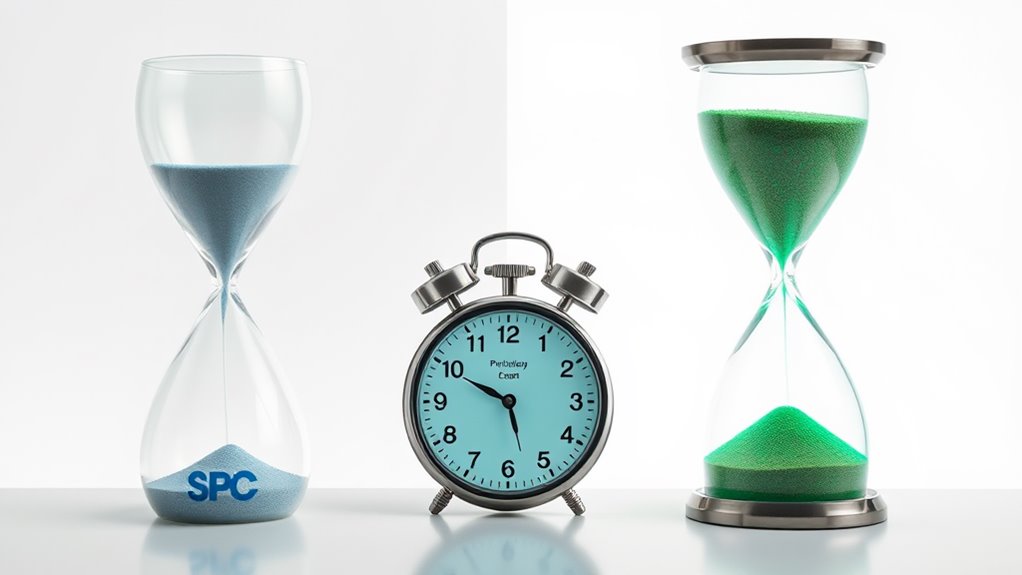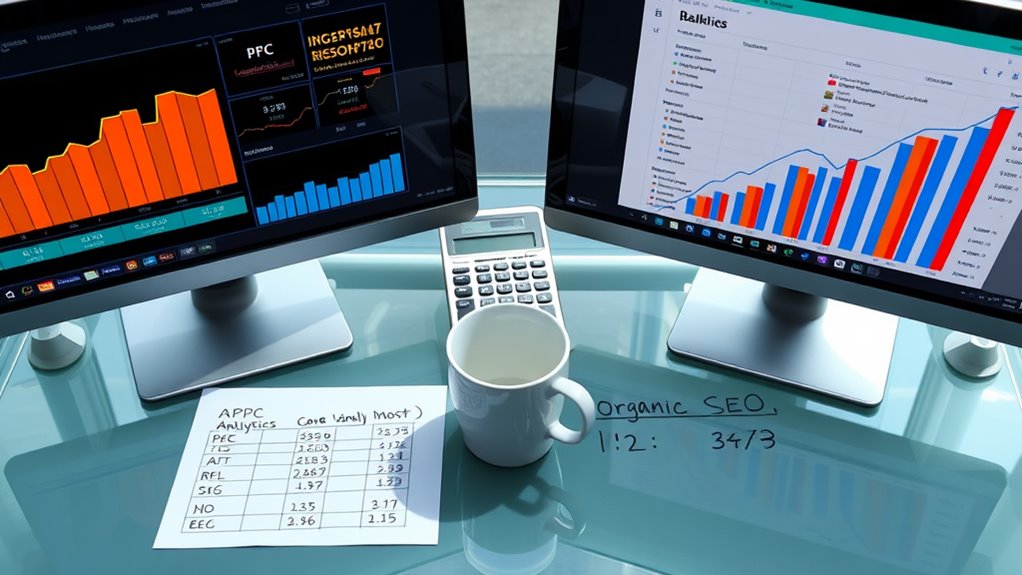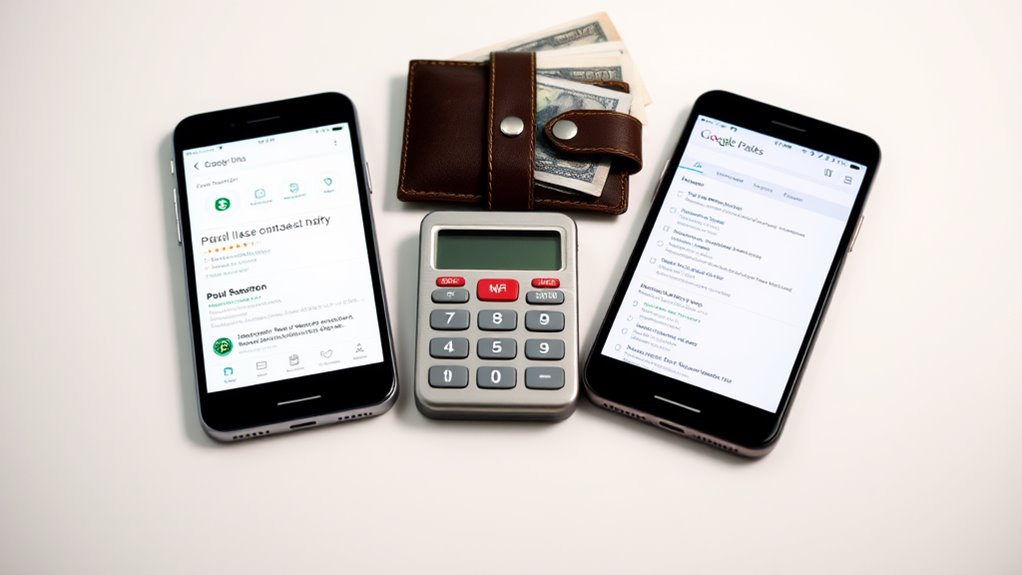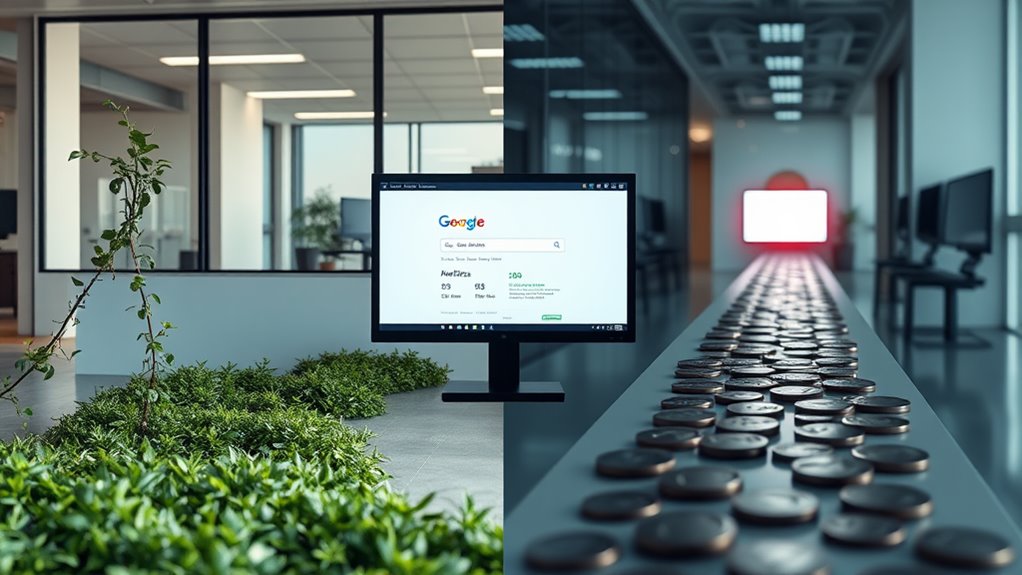PPC isn't necessarily cheaper than SEO – they have different cost structures that suit different goals. While PPC requires ongoing ad spend ($500-$2,000 monthly), it delivers immediate results and predictable costs. SEO demands higher upfront investment ($2,500-$8,000 initially) but can generate better long-term ROI, with potential returns of 5-12x after 12-24 months. Your initial cash flow and growth timeline should guide your choice: PPC works best for quick wins and targeted campaigns, while SEO builds sustainable organic traffic over time. The key lies in understanding how each strategy's cost structure aligns with your business objectives and available resources. Let's explore the specific factors that influence their true costs and effectiveness.
Key Takeaway
- PPC requires lower initial investment ($500-$2,000/month) but demands continuous spending for results.
- SEO needs larger upfront costs ($2,500-$8,000) but delivers better long-term ROI with sustained organic traffic.
- After 3 years, SEO costs $20,000-$40,000 while PPC requires $180,000-$360,000 for similar traffic levels.
- PPC shows steady conversion costs around $50, while SEO costs decrease from $200 to $25 per conversion.
- SEO becomes more cost-effective over time, generating 5-12x return on investment after 12-24 months.
Initial Investment Requirements
In terms of initial investment, PPC and SEO require considerably different upfront commitments. When you're launching a PPC campaign, you'll need to allocate funds for immediate ad spending, typically starting at $500-$2,000 per month, plus management fees if you're working with an agency.
Initial SEO Investment Breakdown:
- Content creation: $1,000-$5,000 for initial website optimization
- Technical SEO setup: $1,500-$3,000 for site architecture
- Keyword research tools: $100-$500 monthly
- Analytics software: $50-$300 monthly
PPC Starting Costs:
- Ad budget: $500-$2,000 monthly minimum
- Platform setup: $200-$1,000 one-time fee
- Management fees: 10-20% of ad spend
- Testing budget: $300-$500 for initial A/B testing
You'll find that PPC delivers faster results with a more predictable cost structure, while SEO requires a larger upfront investment in content and technical optimization. Your choice might depend on your cash flow situation, as PPC allows you to start small and scale quickly, whereas SEO demands substantial initial resources but potentially offers better long-term ROI.
Long-Term ROI Comparison
Most businesses find that SEO delivers superior long-term ROI compared to PPC, typically generating a 5-12x return on investment after 12-24 months. While PPC offers immediate visibility, you'll need to continually fund your campaigns to maintain results, creating an ongoing cost structure that can strain your marketing budget.
Key ROI Factors to Evaluate:
- SEO Compound Effects
- Your content keeps working for you years after publication
- Domain authority builds exponentially over time
- Organic rankings often improve without additional investment
- PPC Cost Structure
- You'll pay for every click, regardless of conversion
- Costs typically increase as competition grows
- Campaign optimization requires constant budget adjustments
When you analyze the numbers over a 3-year period, SEO typically costs $20,000-40,000 initially but can generate $100,000+ in annual organic traffic value. In contrast, PPC might require $5,000-10,000 monthly to maintain similar traffic levels, totaling $180,000-360,000 over three years. While both strategies have their place, SEO's compound growth effect makes it increasingly cost-effective as time progresses, especially for established websites targeting competitive keywords.
Time to Market Analysis

The speed-to-results timeline marks a significant difference between PPC and SEO strategies. When you're launching a digital marketing campaign, PPC can deliver immediate visibility and traffic, while SEO typically requires months of consistent effort before showing significant results.
Understanding the time investment for each approach helps you make informed decisions:
- PPC campaigns can go live within 24-48 hours, allowing you to start generating clicks and conversions almost immediately after setting up your ads and bidding strategy
- SEO typically requires 4-6 months of consistent effort before you'll see substantial organic ranking improvements, though some initial results may appear within 6-8 weeks
- Your PPC results will stop as soon as you pause your campaign, while SEO benefits continue building momentum even during temporary pauses in active optimization
- With SEO, you'll need to factor in time for content creation, technical optimization, and link building, whereas PPC primarily requires initial setup and ongoing bid management
For time-sensitive launches or seasonal promotions, PPC offers the quickest path to market visibility. However, if you're planning for sustainable long-term growth, the extended timeline for SEO shouldn't deter you from investing in organic search optimization.
Resource Allocation Breakdown
Understanding resource allocation between PPC and SEO requires careful consideration of your budget, team capacity, and marketing goals. When dividing your resources, you'll need to account for these key components:
PPC Resource Requirements:
- Ad spend budget: Typically 60-80% of total PPC investment
- Campaign management tools: 5-10% of budget
- Professional management fees: 10-15% of ad spend
- Content creation for ads: 3-5 hours per campaign
- Daily monitoring and optimization: 1-2 hours
SEO Resource Requirements:
- Content development: 40-50% of SEO budget
- Technical optimization: 20-25% of resources
- Link building: 15-20% of budget
- Analytics and reporting: 10-15% of effort
- Training and tools: 5-10% of investment
You'll find that PPC demands more immediate financial resources but less time investment, while SEO requires sustained effort with lower upfront costs. For a typical mid-sized business, you're looking at allocating $2,000-5,000 monthly for PPC campaigns, compared to $1,500-3,000 for SEO initiatives. Your resource distribution should align with your timeline expectations, as PPC delivers quick results while SEO builds long-term value.
Measuring Cost Per Conversion

Measuring cost per conversion accurately reveals whether your PPC or SEO efforts deliver better value for your marketing investment. To calculate this metric, you'll need to track both your total spending and the number of conversions generated through each channel.
Essential Components for Measuring Cost Per Conversion:
- Set up conversion tracking in Google Analytics or your preferred analytics platform to monitor form submissions, purchases, or other desired actions from both PPC and SEO traffic
- Calculate your total investment, including agency fees, tool costs, and internal resource allocation for each channel
- Divide your total costs by the number of conversions to determine your cost per conversion (CPC = Total Cost / Number of Conversions)
- Track these metrics over time, typically in 3-6 month intervals, to account for seasonal variations and market changes
You'll notice that PPC typically shows faster, more predictable cost per conversion metrics, while SEO's cost per conversion often starts higher but decreases over time. For example, your PPC campaigns might maintain a steady $50 per conversion, while SEO could start at $200 per conversion in month one but drop to $25 by month six.
Conclusion
While PPC may require a more substantial upfront investment than SEO's gradual approach, you'll need to weigh your business's unique timing and budget constraints. Your marketing journey might benefit from a balanced strategy that leverages both channels, as PPC offers immediate visibility while SEO builds lasting organic presence. Consider your market position, available resources, and revenue goals when deciding which path to pursue.









